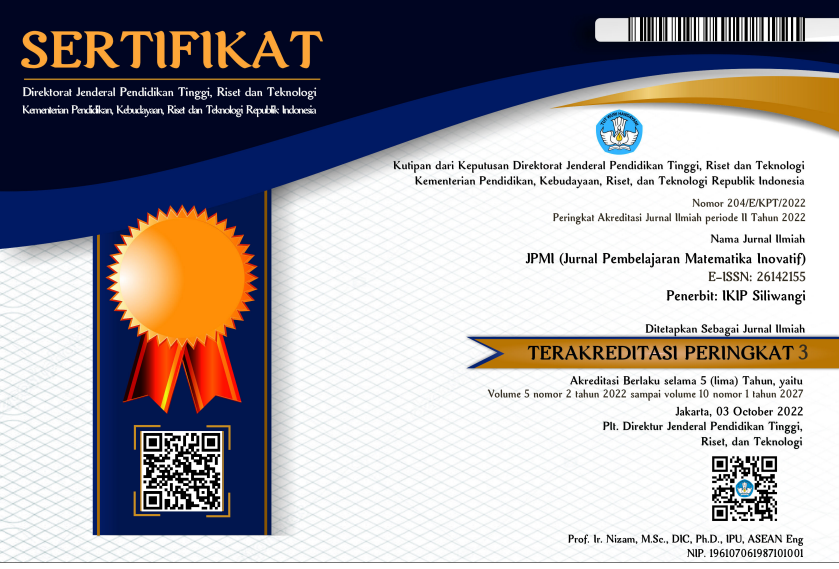IMPLEMENTASI PROBLEM BASED LEARNING TERHADAP HASIL BELAJAR MATEMATIK SISWA SMK KELAS XI
DOI:
https://doi.org/10.22460/jpmi.v5i3.10191Keywords:
Problem Based Learning, learning, improve studentAbstract
The teacher's lack of understanding about the approach used in learning makes students more passive in learning. So that when learning face-to-face, many students do not understand the concept of solving mathematical problems which has an impact on decreasing student learning outcomes. The purpose of this study is expected to be able to restore student activity in understanding mathematical concepts through meaningful experiences without depending on the teacher. So the Problem-Based Learning approach was chosen as the approach taken because Problem-Based Learning is a learning model that applies constructivism theory. This approach is carried out by means of peer tutor discussions. This research is a type of classroom action research using the Kemmis and Taggart model which consists of three cycles where each cycle consists of planning, implementing action, observing and reflecting. Sampling with purposive sampling technique is 10 students of class XI SMK Karya Bhakti Pusdikpal, data analysis technique is to see an increase in learning outcomes from three learning cycles with a limit of 85% reaching the KKM value of 75 according to the MGMP at SMK Pusdikpal. There was an increase in the learning outcomes of Pusdikpal KB Vocational High School students which were originally 67.8 on average, increased to 76.5 and became 83.8. Therefore, it can be concluded that the use of the Problem-Based Learning approach with the peer tutor method is able to improve student learning outcomes.
References
Agustin, V. N. (2013). PENINGKATAN AKTIVITAS DAN HASIL BELAJAR SISWA MELALUI MODEL PROBLEM BASED LEARNING ( PBL ). 2(4), 36–44.
Aisyah, Z. N. M. (2016). Pelaksanakan Penelitian Tindakan Kelas pada Pembelajaran Mata Pelajaran PAI di SMA Negeri 28 Jakarta â€. (pp. 12–45).
Astuti, A. D., & Prestiadi, D. (2020). Efektivitas Penggunaan Media Belajar Dengan Sistem Daring Ditengah Pandemi Covid-19. January, 129–135.
Baety, D. N., & Munandar, D. R. (2021). EDUKATIF : JURNAL ILMU PENDIDIKAN Analasis Efektifitas Pembelajaran Daring Dalam Menghadapi Wabah Pandemi Covid-19. 3(3), 880–889.
Devi, P. K. (2010). METODE-METODE DALAM.
Indarwati, D. (2014). PENINGKATAN KEMAMPUAN PEMECAHAN MASALAH MATEMATIKA MELALUI PENERAPAN PROBLEM BASED LEARNING UNTUK SISWA KELAS V SD Desi Indarwati. 30, 17–27.
Marlina, R., Nurjahidah, S., Sugandi, A. I., & Setiawan, W. (2018). PENERAPAN PENDEKATAN PROBLEM BASED LEARNING UNTUK MENINGKATKAN KEMAMPUAN PEMECAHAN MASALAH MATEMATIS SISWA KELAS VII MTs PADA MATERI PERBANDINGAN DAN SKALA. 1(2), 113–122.
Murtikusuma, R. P. (2015). PENGEMBANGAN PERANGKAT PEMBELAJARAN MATEMATIKA MODEL PROBLEM-BASED LEARNING BERBANTUAN MEDIA POWERPOINT UNTUK SISWA KELAS XI SMK. 17, 20–33.
Putra, N. (2010). METODE-METODE DALAM PEMBELAJARAN IPA UNTUK GURU SD.
Rohmah, G. S., & Mahardika, N. G. (2018). MENINGKATKAN KEMAMPUAN KONEKSI MATEMATIS SISWA SMP MELALUI PENDEKATAN PROBLEM BASED LEARNING. 1(4), 591–598.
Rusman. (2011). Model-model pembelajaran: Mengembangkan profesionalisme guru. Rajawali Pers/PT Raja Grafindo Persada.
Syafitri, I. R., Heleni, S., & Solfitri, T. (2021). Pengembangan Perangkat Matematika Berbasis Problem Based Learning pada Materi Bentuk Aljabar Kelas VII SMP/MTs. 4(2), 181–188.
Titasari, N., Hendriana, H., & Setiawan, W. (2019). MENINGKATKAN KEMAMPUAN PEMAHAMAN DAN MOTIVASI BELAJAR SISWA SMP DALAM MENYELESAIKAN MASALAH TEOREMA PYTHAGORAS MENGGUNAKAN PROBLEM BASED LEARNING. 01(03), 550–561.
Vitasari, R., Joharman, & Suryandari, C. (n.d.). PENINGKATAN KEAKTIFAN DAN HASIL BELAJAR MATEMATIKA MELALUI MODEL PROBLEM BASED LEARNING SISWA KELAS V SD NEGERI 5 KUTOSARI.

















